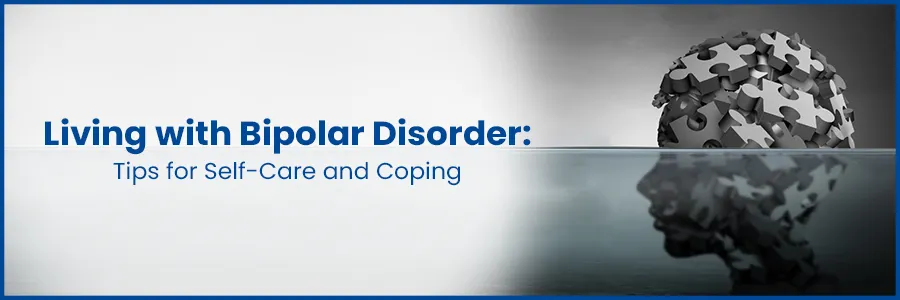- Cardiology 84
- Dermatology 45
- Endocrinology 33
- ENT 16
- Fertility 190
- Gastroenterology 78
- General-Medicine 81
- Gynecology 80
- Hematology 19
- Infectious-Diseases 33
- Neurology 52
- Oncology 34
- Ophthalmology 23
- Orthopedics 69
- Pediatrics 31
- Procedure 23
- Public-Health 144
- Pulmonology 59
- Radiology 8
- Urology 68
- Wellness 161
- Woman-and-child 77

Understanding Living with Bipolar Disorder
Being bipolar can be a difficult journey, distinguished by its highs and lows, necessitating the use of efficient self-care and coping mechanisms.
Manic depression, another name for bipolar disorder, is a mental health condition that involves:
Here, we'll explore essential tips for self-care and coping when living with bipolar disorder, touching upon the importance of mental health awareness and managing mood swings.
- Extreme mood swings,
- Including manic episodes of heightened energy
- Depressive episodes of low mood.
What is Bipolar Disorder?
Bipolar disorder is one of the most widely recognized mood disorders, characterized by shifts between depressive episodes and manic or hypomanic episodes. While it's distinct from schizophrenia and anxiety disorders, there can be overlapping symptoms, making proper diagnosis crucial for effective treatment.
Bipolar Disorder Treatment Options
Medication for Bipolar Disorder
- Types: Mood stabilizers, antipsychotics, antidepressants.
- Effectiveness: Managing mood swings and preventing relapses.
- Considerations: Side effects, adherence to medication regimen.
Psychotherapy and Counseling
- Types: Cognitive-behavioral therapy (CBT), psychoeducation, interpersonal and social rhythm therapy (IPSRT).
- Role: Managing stress, identifying triggers, improving relationships.
Lifestyle and Self-Care Strategies
- Importance: Regular sleep patterns, balanced diet, avoiding substance abuse.
- Support Networks: Family, friends, support groups.
How to Deal with Bipolar Disorder
- Recognizing Triggers: Stress, lack of sleep, substance use.
- Creating Stability: Routine daily activities, setting realistic goals.
- Monitoring Mood: Mood tracking apps, journaling.
Ready to take control of your health journey? Book your appointment now and start your path towards wellness today!
Book an AppointmentOvercoming Bipolar Disorder
- Education: Understanding the condition and treatment options.
- Seeking Support: Therapy, support groups, trusted individuals.
- Self-Advocacy: Communicating needs with healthcare providers, adherence to treatment.
Conclusion
Bipolar disorder is a manageable condition with proper treatment and support. By understanding its symptoms, seeking appropriate treatment, and adopting healthy coping strategies, individuals with bipolar disorder can lead fulfilling lives.
Frequently Asked Questions
Extreme mood swings, such as times of mania and despair, characterize bipolar illness, a mental health disease. It can impact daily life by causing shifts in energy, mood, and behaviour.
Self-care practices for bipolar disorder include maintaining a regular sleep schedule, engaging in physical activity, practising mindfulness, and managing stress through relaxation techniques.
Yes, a strong support system that includes friends, family, and mental health professionals can provide emotional support, understanding, and assistance in managing the challenges of bipolar disorder.
Mindfulness and meditation practices can enhance self-awareness, reduce stress, and promote emotional regulation. They encourage being present in the moment and can be particularly helpful during both manic and depressive episodes.
If coping becomes challenging, seeking professional help is essential. Mental health professionals, including therapists and psychiatrists, can provide guidance, adjustments to treatment plans, and strategies for managing symptoms effectively.
Yes, numerous mental health organizations, online communities, and support groups are dedicated to providing information, resources, and a sense of community for individuals living with bipolar disorder.
While self-care and coping strategies can significantly reduce the frequency and intensity of mood swings, bipolar disorder is a complex condition that may still involve some degree of mood fluctuation.Working closely with healthcare professionals remains crucial for effective management.

- Cardiology 2132
- Dermatology 168
- Endocrinology 135
- ENT 97
- Fertility 217
- Gastroenterology 232
- General 478
- General-Medicine 1685
- Gynecology 169
- Hematology 85
- Infectious-Diseases 208
- Neurology 207
- Oncology 345
- Ophthalmology 65
- Orthopedics 187
- Pediatrics 83
- Procedure 72
- Public-Health 209
- Pulmonology 126
- Radiology 13
- Second Opinion 311
- Urology 294
- Wellness 600
- Woman-and-child 447
Related Blogs
If you have any questions, please fill out the enquiry form or call us, and we will get back to you promptly.
040-68334455